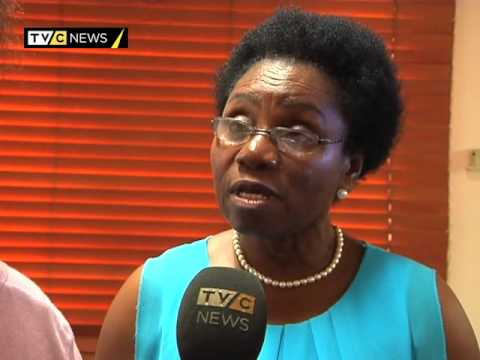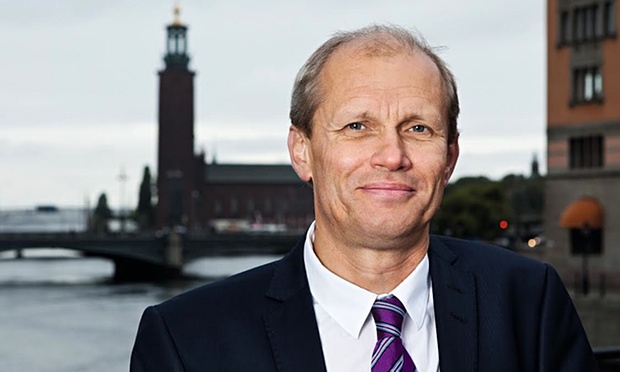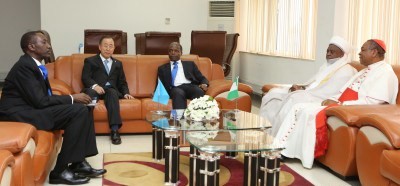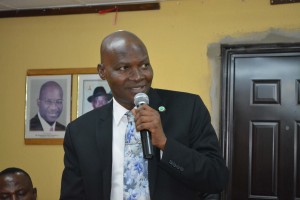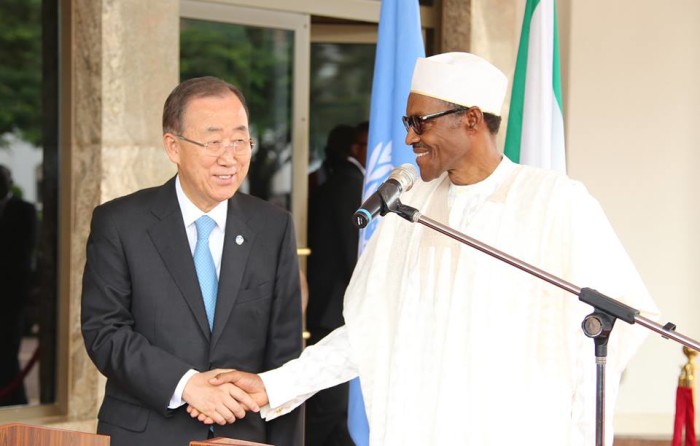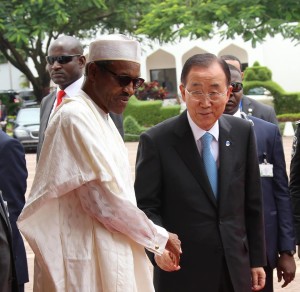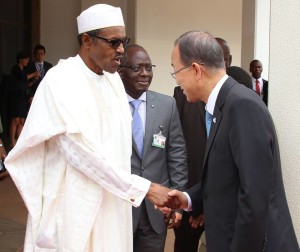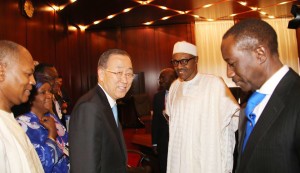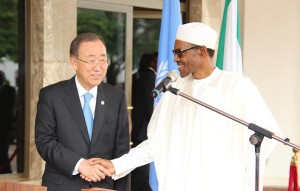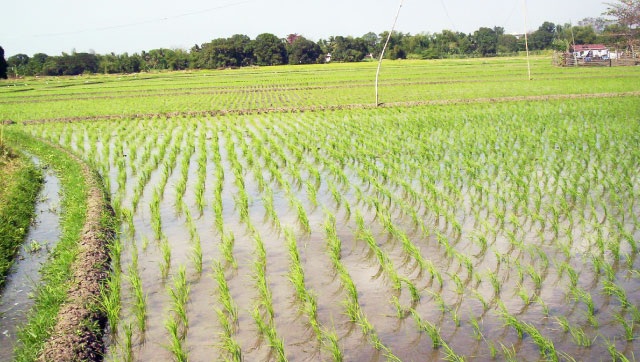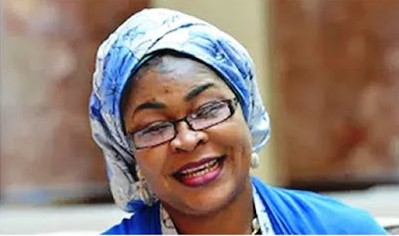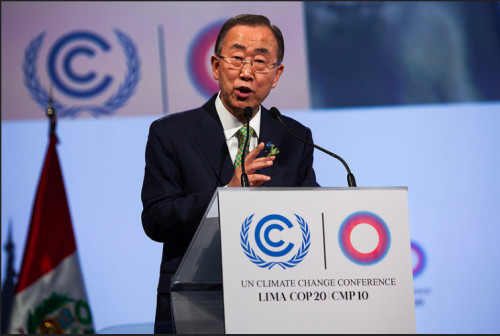Nigeria ranks sixteenth among nations with high maternal deaths. To reduce the incidence, advocacy groups say exploring the possibility to incorporate the communities will scale up progress
Video: Changing weather pattern in Nigeria
The rainy season in Nigeria is usually between the months of March through July with a break in August before it picks up again in September.
However, the pattern of the weather in the Southern part of the country in recent weeks has been unusually cool and breezy.
In this report Emmanuel Oladipo, a professor of climatology , department of Geography, University of Lagos, tells me what could be responsible.
Stockholm water week opens amid hope for solutions
The 2015 World Water Week, themed Water for Development, officially opened on Monday August 24 in Stockholm with over 3,000 participants from more than 120 countries, representing governments, academia, international organisations, civil society, the corporate sector, and many others.
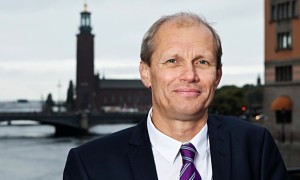
The role of water for development cannot be overestimated. Water is the foundation for all aspects of human and societal progress. We need it to survive – literally, to quench our thirst, to prepare our food, and maintain our hygiene, but it is also central to economic and social development, sustainable growth, and a prerequisite for healthy ecosystems.
This year, a decision on the Sustainable Development Goals will be followed by a new climate deal at COP21 in France. Water’s role in these processes, and in development, is crucial. With water availability severely altered by climate change, and a growing world population needing more food and demanding more goods and services, time is not on our side.
“From the Horn of Africa, over the Sahel, to São Paulo, California and China, people’s perseverance is being tested. We can no longer take a steady water supply for granted. The many local water crises today combine into a severe global water situation of great concern to all of us,” Torgny Holmgren, Executive Director of Stockholm International Water Institute (SIWI), told the opening session.
In his opening address, the Prime Minister of Sweden, Stefan Löfven, said: “When the international community is shaping a new sustainable development agenda, water management and allocation must be at its heart. Not only as a separate goal but as an essential vehicle for development and health.”
Painting a very serious picture when talking about climate change and the effect it has on his small island nation, the President of the Marshall Islands, Christopher J. Loeak, said: “We are a country contemplating a future where we are literally being wiped off the map of the world. As the leader of my country I cannot look my people in the eyes and with good conscience say that everything will be ok, when I know the world continues to travel down a very destructive path.” President Loeak underlined the great importance of reaching an ambitious climate agreement during the upcoming COP21 in France.
The Prime Minister of Jordan, Abdulla Ensour, described the extreme pressure his country is under due to the combination of water scarcity and a very large refugee population, and emphasised the importance of regional cooperation over water.
Peru’s Minister of State for Environment and President of the COP20, Manuel Gerardo Pedro Pulgar-Vidal Otálora, echoed the words of several of the speakers and added weight to the argument that water must be made a key player in the climate debate.
During World Water Week, three prizes are awarded, to recognize excellence in the water world. On Sunday, the Stockholm Industry Water Award was awarded to CH2M, a Colorado-based global service and engineering company, for developing and advancing methods to clean water, and increasing public acceptance of recycled water.
On Tuesday, 25 August, the Stockholm Junior Water Prize will be awarded to one national team out of the 29 competing nations by H.R.H. Crown Princess Victoria of Sweden.
On Wednesday 26 August, the prestigious Stockholm Water Prize will be awarded to Rajendra Singh of India, for his innovative water restoration efforts, improving water security in rural India, and for showing extraordinary courage and determination in his quest to improve the living conditions for those most in need. The prize will be awarded to Rajendra Singh by H.M. Carl XVI Gustaf, King of Sweden, during a ceremony in Stockholm City Hall.
Photo: Osinbajo, others receive Ban Ki-moon
Vice President, Professor Yemi Osinbajo (SAN), on Monday August 24, 2015 hosted visiting UN Secretary General, Ban Ki-Moon, in dialogue on Democracy, Development, Climate Change and Countering Violent Extremism. The forum was attended by dignitaries.

Femi Olomola: We’ll create millions of job units through LUPAR
Dr Femi Olomola is the 21st President of Nigerian Institute of Town Planners (NITP). In this interview with Kayode Aboyeji, he speaks on the implications of the recent United Nations report that projects that Nigeria will be the third largest country by the year 2050, why governments need to budget for planning activities and the plans by his administration to create units of jobs for town planners in the country.
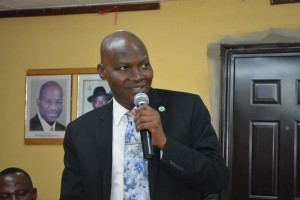
A recent report by the United Nations projected that Nigeria will become the third largest country in the world by the year 2050. As a town planner, what are the implications of this?
The implication is enormous. It has the implication for housing because when you are the third largest in the whole world, how do you house the people? Bearing in mind that with what we have now, we can’t even house ourselves, and by the time the figure rises to what is being projected, it has implication for housing. It has implication for transportation. All these people will need to move from point A to point B. Even with our population now, we don’t have any effective system of mass movement, so the implication for transport will be massive. It will have implication also for water supply; all the cities, millions and billions of people that will be added, they need to drink water on a daily basis. As at now, we can’t even give sufficient water to the population we have.
Come to refuse disposal and collection, it is there as well, huge population, the tonnes and tonnes of refuse they will be generating, they have to be moved from one point to the other, they have to be transported and disposed of. Again with what we have now, we can’t even manage it. It has implication for electricity consumption as well. With our small number now, we can adequately provide enough electricity for our need. Security implication is there, with a large number of people, crime rate will go up. With what we have, we can’t adequately police ourselves, when the figure rises, God help us. The implications are in all ramifications. Even for education as well, we are talking of inadequate places for our children in the polytechnics, universities, primary, secondary and all phases of education. By the time we have that figure, you can imagine, there will be exponential growth. So the implications are overwhelming and they cover all sectors of our living. So the implication is very frightening.
As an urban planner, what would be your advice for the President Buhari-led administration in that regard?
One of the very fundamental problems we have even with this small population, why we can’t even manage it, why we can’t give them any good environment is because we don’t plan. This is a country where nobody plans. Look at Lagos State, the so-called Centre of Excellency. How much of Lagos is covered by planning? Because when you don’t plan, it is just funny, you wake up and you think things just occurred as if that is the way nature wants it. Look at simple human being, when you don’t plan your life and you only live day to day, you will see chaos, you will lack focus, self-control will not be there. So the same thing happens in the urban centres, when there is no plan guiding the growth of anywhere, everybody building where he or she considers, so what we have at the end of the day is chaos.
The only way out is to ensure that, in line with our regulation, we have a law in Nigeria that says every square inch of land must be planned. It is there in the Nigerian Urban and Regional Planning Decree 88 of 1992. It is there, every square inch of land in this country must be covered with a development plan, master plan, district plan, local or regional plan as the case may be, so that all developments that are taking place are guided by that plan. We don’t have them. If Lagos hasn’t got it, you can imagine what will be the situation in other states where they have fewer resources and they don’t even have the human capacity in terms of manpower to carry out plans, to enforce development control decisions and virtually country development.
The only way out is to further develop institutional framework for planning; let there be plan, let the plan cover every inch of land, let it be monitored, provide money to actually implement the plan, that is the only way out.
What exactly do you think is responsible for the lack of planning in the country?
The most important is that there is a lack of political will, which is number one. When there is no political will, it manifests itself in poor and almost zero budgetary allocation for planning. For planning we don’t give enough allocation for it. Another one is that we don’t even have manpower both qualitatively and quantitatively to actually carry out effective planning in the country. The third one is, we are a sort of funny society where the rule of law is not part of our culture. People will rather break the law, build without approval, carry out development without required approval and they think once they have done that they will be able to sort it out. So societal ways of life do not particularly encourage respect for the rule of law.
And again, I think another thing is our value system. A lot of Nigerians have not really seen an ideal environment. We were born in chaos, bread in chaos and we live in chaos. So when you are even talking of what I consider to be an ideal setting, environment people can even conceptualise it, they cannot understand it. Look at el-Rufai, he put some sanity in the planning system in Abuja, demolished a lot of illegal buildings and people hated him for that. When you are even trying to uphold the rule of law in our own country here, people don’t particularly seem to appreciate you. The system here is, we are all born not to respect the law, government doesn’t respect the law, politicians who makes the law doesn’t respect the law, the average man doesn’t respect it. Like I said earlier, the money is not there for us to have the kind of environment we are dreaming.
There is what I will call inconsistencies in the interpretation of plan; even where they are, in the few areas where there is development plans in Africa, they are not interpreted consistently, and they bend the rule. When it doesn’t suit them they change the use of the land abruptly, illegal allocation, conversion of a lot of things that are not really in the interest of the society.
With the change slogan of President Buhari administration, what is Nigerian Institute of Town Planners doing in the area of legal framework and to ensure that there is compliance to all of these?
What we planned to do is these, one, when he became the Head of State, we sent him a congratulatory message, put up a one-page advert to congratulate him. As I’m talking to you now, we have a position paper of NITP which we have prepared to present to him, but we have not been able to see him because we believe he is too busy now with so many issues, and then he has not even got the ministers, we are all hoping that by the end of this month or early September as he promised, the ministers will be in place. We are of the opinion that it is when that is in place that we will now put in enough pressure to see the head of state and present our position paper. We think by the time he appoints ministers the work load on him will be a little bit less, at least he will have people to handle various sectors and I think at that point he will be able to listen.
In your acceptance speech as the NITP President, you said your administration would look into how to create at least five million jobs for registered town planners. What informed this?
Let me correct something, I didn’t say five million jobs, I said five million units of jobs and what I mean by that is, we came up with this concept wherein a report is to be prepared called LUPAR, it is a Land Use Planning Analysis Report which in our opinion will be of valuable service to applications to Corporate Affairs Commission (CAC) for registration of companies; it will be of use to applicants who want to open a current account for their company in banks, it will be of use to our colleagues in government for approval of building permit, we are of the opinion that the Insurance companies will find it very useful in building insurance, we are of the opinion that the Department of Petroleum Resources of NNPC will equally find it useful and relevant in the issuance of development permit to their contractors to carry out some of their activities under their control.
So the list is endless, we have been able to identify about nine different areas where that particular report could be useful and that report shall be prepared by registered town planners. When I look at that number of use, I look at a report as unit of job and when I look at all these multi-various use which we have advanced for the report, I think nationally, we should be looking at something close to that five million or more units of jobs to be so created. I am sure that, in the next one month, a model of the report will be ready. We have made it the theme of our MCPDP all over the country, we have done it in Port-Harcourt, Ibadan and Kaduna, and it was very well received by our members, they commented over it, we are now sure of what and what will be the content of that report for each areas identified. Our plan is that, by the grace of God, it will become operational in 2016.
You mentioned the challenge of manpower earlier on. How do you intend to address that by the time LUPAR becomes operational?
What we have done through the MCPDP, we have in our opinion sufficiently build the capacity of our members so that they will be able to effectively discharge that particular responsibility in the preparation of the report. When I spoke early about the shortage of manpower both quantitative and qualitative, what I mean is that, if you look at the provisions, the law, in the Nigerian Urban and Regional Planning Decree 88 of 1992, wherein it was stated that every square inch of land in Nigeria must have a development plan to guide its development, if that provision is to be effectively carried out, by now Nigeria must have 3,200 development plans covering all different aspects of Nigeria as a way to guide development. If you look at it, that 3,200 plans once you prepare them, you need manpower to implement, enforce and monitor them. We don’t have that manpower in Nigeria for now, unfortunately, even the once we have, they are not 100 per cent employed, back to what I was saying earlier that the political will is not there. Despite the fact that we need so many, even the ones we have, of what use are we making of them? A lot our members are on the street roaming about, no job, because government is not fully committed or they don’t seem to believe planning is a critical product which they must provide for in their various plans.
What legacy will you like to leave behind as the President of NITP?
I will be happy the day any of all the people we have listed down, potential organisations that will use LUPAR, the moment they start adopting the system and integrating it into their own policy framework for all their own operational modalities, that is my vision. I want LUPAR to be one of the landmarks of my administration which I want to leave behind.
The other thing I equally want to say is that, during my tenure, we have so far tried as much as we can to promote internal democracy of the institute; we have done that very well. We democratise and gave a lot of power to the grassroots, our state chapter chairmen are very functional, they have a say in how we run the affairs of the institute, I am happy about that. But, of all these things, the one that is dearest to my heart is LUPAR which we are pursuing with all the energy we have.
Community laments lack of drinking water in Otuoke, Jonathan’s hometown

Ateki told the News Agency of Nigeria in Otuoke on Sunday that lack of drinking water was the major problem in the community.
FADAMA III scheme uplifts farmers in Niger State

Niger State is presently cultivating 371,482 hectares of rice, mostly under the production season of rainfed.
Flagship energy scheme to empower, lift rural women
In the bid to promote inclusive clean energy access and empower rural women to rise out of poverty, a special training and skill acquisition workshop will hold in Abuja from Tuesday, 25 to Friday, 28 August 2015. It is the Maiden Edition of the Rural Women Energy Security (RUWES) Initiative Capacity Enhancement Workshop. It has “Unveiling the Potential of the Rural Women” as its theme.
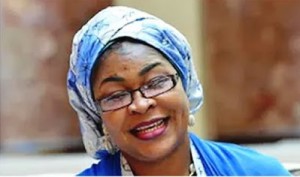
Targeted at RUWES member organisations and internally displaced women and girls, the workshop will also serve as an avenue to further strengthen the RUWES Network as a ‘Self-Help Forum’ where women and key stakeholders come together to discuss experiences, overcome challenges and grow, says an official of the United Nations Development Programme (UNDP), which is supporting the scheme.
“The RUWES Initiative aims to eradicate energy poverty among rural women and ensure that women are more energy efficient and less dependent on fossil fuels for cooking, heating and lighting using green energy alternatives. In the long term, the use of clean energy will improve health; drastically reduce deforestation and other negative environmental outcomes as a result of indiscriminate felling of trees for use as fuels,” he states, adding:
“In addition to Gender Empowerment and Climate Action, the RUWES Strategy will inform and contribute to the Post-2015 Development Agenda, potentially saving millions of lives every year currently lost to air pollution related illnesses, and avoiding more than 10 million tons of annual crop losses. We very much appreciate taking on this challenge with you.”
Visiting Ban Ki-moon meets Buhari, youth leaders
President Muhammadu Buhari is scheduled to play host to the visiting United Nations Secretary-General, Ban Ki-Moon, on Monday at noon, at the Presidential Villa, Abuja.
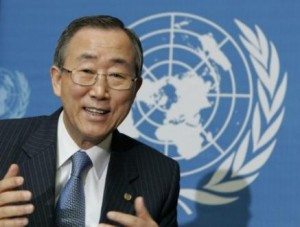
According to a media advisory signed by Oche Egwa on behalf of the Office of the Special Adviser to the President on Media and Publicity, Buhari and Ki-Moon will address a joint press conference at the end of their closed-door session. The meeting is scheduled to hold at noon.
Ki-Moon, according to the statement, will later return to the Presidential Villa for a dinner to be hosted in his honour by the President.
The dinner is billed for the new Banquet Hall of the Presidential Villa by 7pm.
Similarly, the UN Secretary General will meet with 10 young leaders to answer questions on development, climate change and the role of young people. Ahead of the meeting, some delegates would be live on radio: Cool FM (96.9) 9:00 – 9:20 and Nigeria Info FM (95.1) 2:00pm – 3:00pm all GMT+1.
In the light of the large usage of Twitter by young people in Nigeria, there will be a TweetMeet Session that will provide a platform for young leaders and colleagues to discuss development and their role in shaping a better future for all.
It holds on Monday, August 24, 2015 by 5:30 – 6:30 PM GMT+1. The Twitter Channels are: #Action2015NG #SDGs and #SDGsNG @UN_Spokesperson @mcampaign.
The goals of the event are to:
- Promote the sustainable development goals and increase momentum and ownership in Nigeria.
- Produce and communicate key messages to influence national political actions towards the implementation of the SDGs.
- Increase the knowledge of young people in Nigeria and across Africa on the new development agenda, especially on its opportunity for dealing with youth development issues.
- Inspire the next generations of leaders on their roles in promoting sustainable development.
Twitter handles of the Young Delegates who will be representing Nigerian Youth: @missamah05 @estherclimate @mareeyama @rotexonline @vinnydrey @edwindaniels @christyasala @ojonwa @SpeshYh @Hamzy12.

